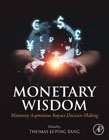
Monetary Wisdom: Monetary Aspirations Impact Decision-Making
Li-Ping Tang, Thomas
Globalization creates economic prosperity for citizens around the world. It changes people’s deep-rooted attitudes, values, and behavioral patterns. Editor Thomas Li-Ping Tang is the first to scientifically capture the meaning of money and coin the contemporary love of money construct. Ardent monetary aspirations involve affective, behavioral, and cognitive subconstructs. Monetary Wisdom: Monetary Aspirations Impact Decision-Making bridges the gaps between behavioral economics, business ethics, decision-making, and the psychology of money. It compiles research from world-renowned experts in 37 countries across 6 continents. This book presents an excellent collection of innovative and multicultural views. Monetary Wisdom investigates how individuals apply monetary aspirations as a lens, frame critical concerns at the proximal and omnibus contexts, and maximize expected utility and ultimate serenity at the individual, organizational, and global levels. The books’ practical implications help readers apply and enjoy these discoveries’ benefits. Inspires readers to learn one of the world’s most often used money attitude measuresNotices that, in modern societies, money is power at the individual levelSuggests that monetary aspirations (not money itself) predict cheatingProfiles that reducing stress curbs dishonesty directly and indirectlyIllustrates that leaders promote employees’ honesty and creativityReveals how corruption expands prospect theory to a global levelExplores the contexts to achieve balanced aspirations and serenity INDICE: Introduction: Monetary wisdom: Crafting an inspirational, memorable, and practical theory and telling an interesting storySection A: Money, monetary values, and motivation1. Money is power: The love of money and materialism among Czech university students2. Are you satisfied with your pay when you compare? It depends on your love of money, pay comparison standards, and cultureSection B: Monetary values, temptation, and dark consequences3. Falling or not falling into temptation? Multiple faces of temptation, monetary wisdom, and unethical intentions across genders4. Temptation, monetary wisdom (the love of money attitudes), and environmental context on unethical intentions and cheating5. Avaricious justice-seeking dishonesty-Aspiration, dissatisfaction, and low transparency incite cheating: The dark side of monetary decision-making6. Theory of monetary wisdom: Money attitudes predict religious values, making money, making ethical decisions, and making the grade-Academic achievement7. Is the love of money the root of all evils? Income, the love of money, pay satisfaction, commitment, and unethical intentions among Hong Kong professionals8. Intelligence vs. wisdom: Does ethics intervention enhance learning and virtue? Money, the love of money, Machiavellianism, and dishonesty across majors and genders9. Behavioral economics and Monetary Wisdom: The Enron Effect-Love of money, Corporate Ethical Values, Corruption Perceptions Index (CPI), and dishonesty across 31 geopolitical entities10. Behavioral economics and monetary wisdom: A cross-level analysis of monetary aspiration, pay (dis)satisfaction, risk perception, and corruption in 32 nationsSection C: Leadership, creativity, and honesty11. Do leader and member perceptions of the LMX excite member creativity? The mediating role of employee positive emotion12. Love of Money and unethical behavior intentions: Do perceptions of Authentic Supervisors' Personal Integrity and Character (ASPIRE) make a difference?13. Does moral leadership enhance employee creativity? Employee identification with the leader and leader-member exchange (LMX) as two mediators: Discovery from China’s emergent market14. Do victims of supervisor bullying suffer from poor creativity? Social cognitive and social comparison perspectives15. Do ethical leaders enhance employee ethical behaviors? Organizational justice and ethical climate as dual mediators and leader moral attentiveness as a moderator: Empirical support from Iraq’s emerging marketSection D: Monetary Wisdom, well-being, global challenges, and implications16. Does interpersonal justice enhance organizational loyalty? A theory of justice, organizational citizenship behavior, and individualism: Testimony from Kyrgyzstan17. European airline cockpit and cabin crew well-being during the COVID-19 lockdown: Does union satisfaction have a buffering effect on mental health, organizational dehumanization, medication use, and job insecurity?18. The Matthew Effect in Monetary Wisdom19. Detecting honest people’s lies in handwriting: The power of the Ten Commandments and internalized ethical values20. Behavioral economics and Monetary Wisdom across 32 cultures: Good apples enjoy a good quality of life in good barrels21. Youth materialism and consumer ethics: Gen Z adolescents’ self-concepts (power and self-esteem) as dual mediators and culture (China vs. France) as a moderator22. Monetary wisdom’s practical implications-Does mindfulness excite ethical intentions via diminished avaricious monetary aspirations? Mindfulness training, timing, and practice23. Consumer behavioral economics and monetary wisdom-A penny saved is a penny earned: Monetary intelligence and emotional intelligence impact financial decision-making
- ISBN: 978-0-443-15453-9
- Editorial: Academic Press
- Encuadernacion: Rústica
- Páginas: 564
- Fecha Publicación: 21/05/2024
- Nº Volúmenes: 1
- Idioma: Inglés
